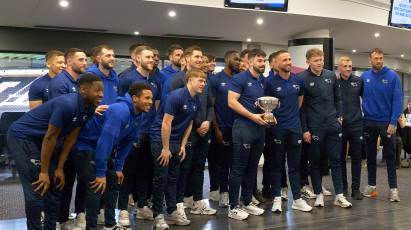In October’s edition of Derby County’s new monthly magazine, which was launched at the start of the 2020/21 season, the club produced an in-depth feature in relation to why the Rams continue to take the knee before matches.
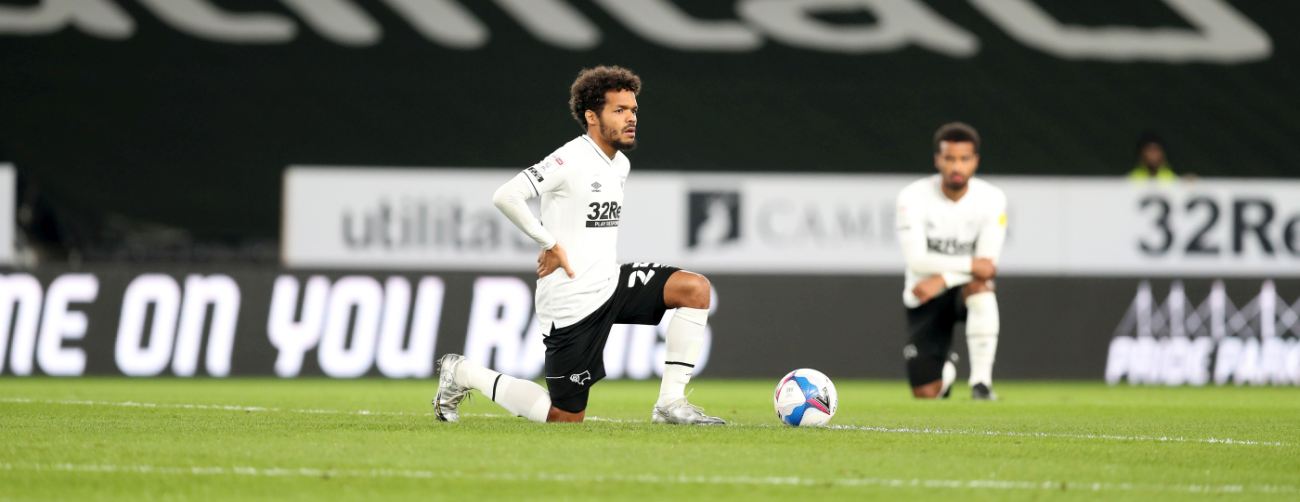
The full article, which includes interviews with Curtis Davies, Duane Holmes, Liam Rosenior and George Evans, can be found below.
***
Stop. Don’t just flick straight past this article because it’s an ‘uncomfortable subject’, because it has ‘nothing to do with football’, because ‘all lives matter’. Read on because it is a very important subject, it has everything to do with football - the game that mirrors society, because BLACK LIVES MATTER. This isn’t an opinion piece, these are the gut-wrenching, unbelievable-for-some-but-reality-for-others, utterly disappointing facts.
You stand with them on a matchday when they wear the Ram on their chest, scoring goals for your beloved team, putting their body on the line to defend. So, kneel with us, Derby County, every day in solidarity as we continue to fight for our Black players, Black coaches, Black opponents, Black employees, Black fans and every Black person in this world because every day the colour of their skin means there is no level playing field.
But taking the knee is only just the surface.
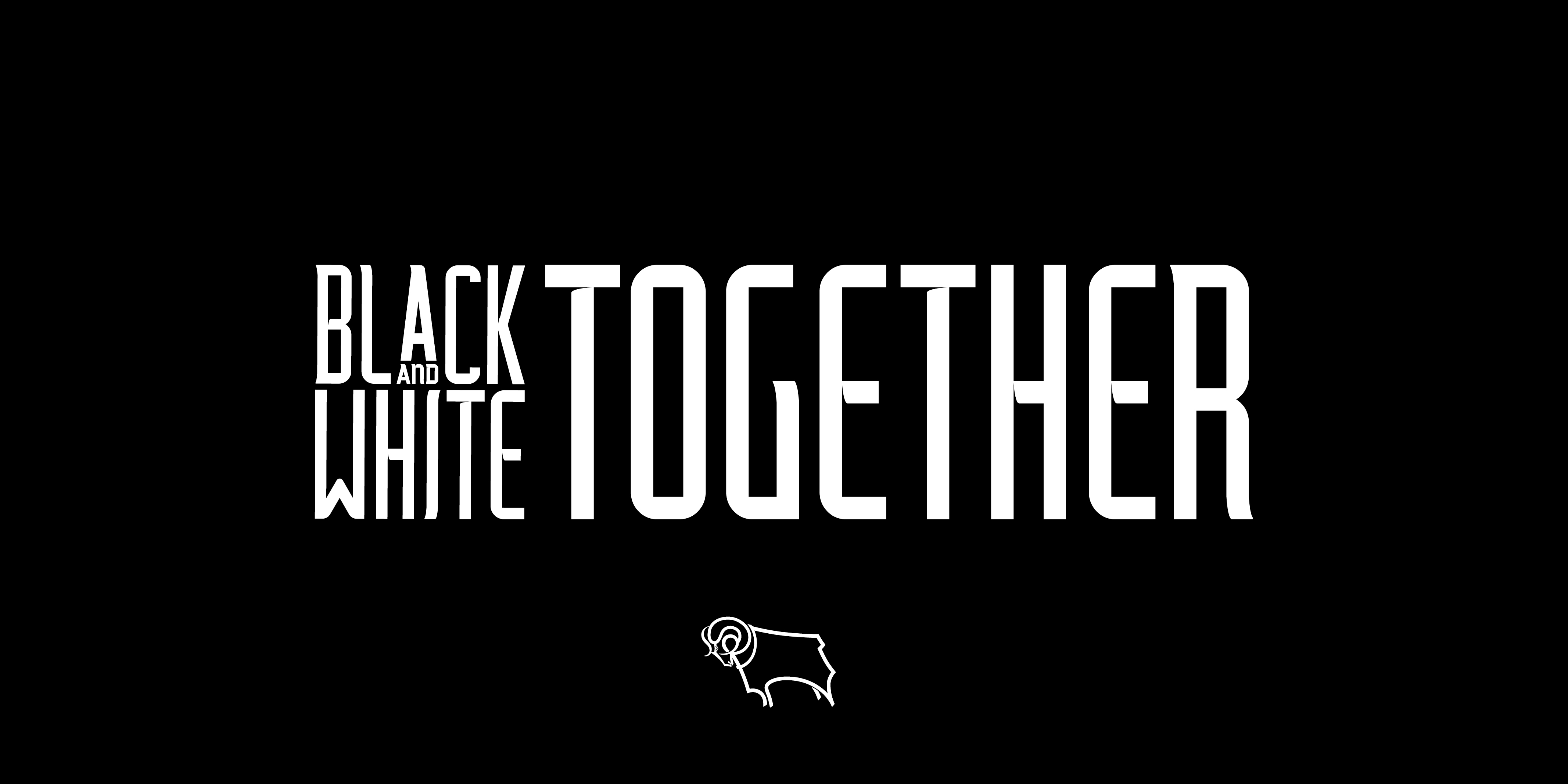
THE MOMENT
To answer the question of why Derby’s players continue to kneel ahead of their games, it is important delve into the stories behind the symbol. Curtis Davies and Duane Holmes and first-team coach Liam Rosenior candidly spoke about their experiences as Black men and though their stories differed in content, the themes remained the same - the most striking may have been their ‘moment’.
As each recalled their different upbringings, there was a part where each explained the moment their innocence was stripped away and they realised they were different and the colour of their skin would mean their life would be that bit harder than their peers of other races.
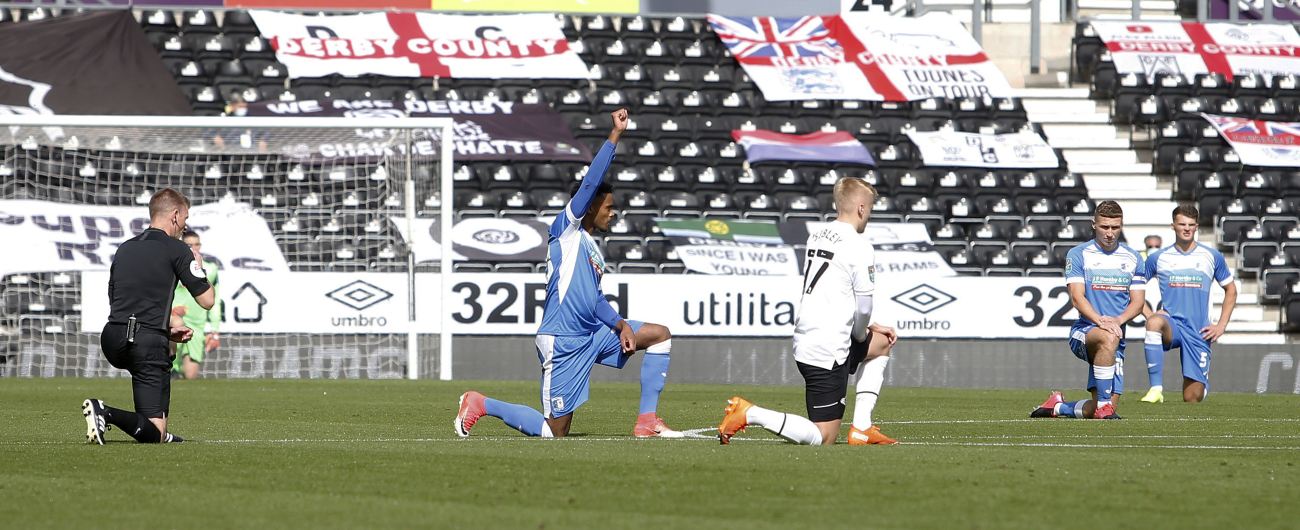
“It is predominantly White where I grew up,” Holmes explained. “Everyone is working class. No-one really has much, so I didn’t really see myself as different until I was about ten when someone stopped me when I was walking with my mum. They asked me if I was ok and where my family was, but I was stood there with my mum who is white.
“She had to explain why I could be treated different and as a young kid I thought ‘this isn’t right, I can’t help it. I am still the same person’. There are micro-racisms, as I call them, it is little things like: ‘you don’t sound black, you don’t talk black, you are intelligent for a black person’.
He added: “I think the biggest thing for me is when I have conversations with my dad, who lives in America, and he won’t let me go back home because it is not safe for young Black men and that is a scary thought.”
For Davies, that moment came a little later in life, when he was in his mid-teens and was walking from the basketball court, ball in hand, with his two friends.
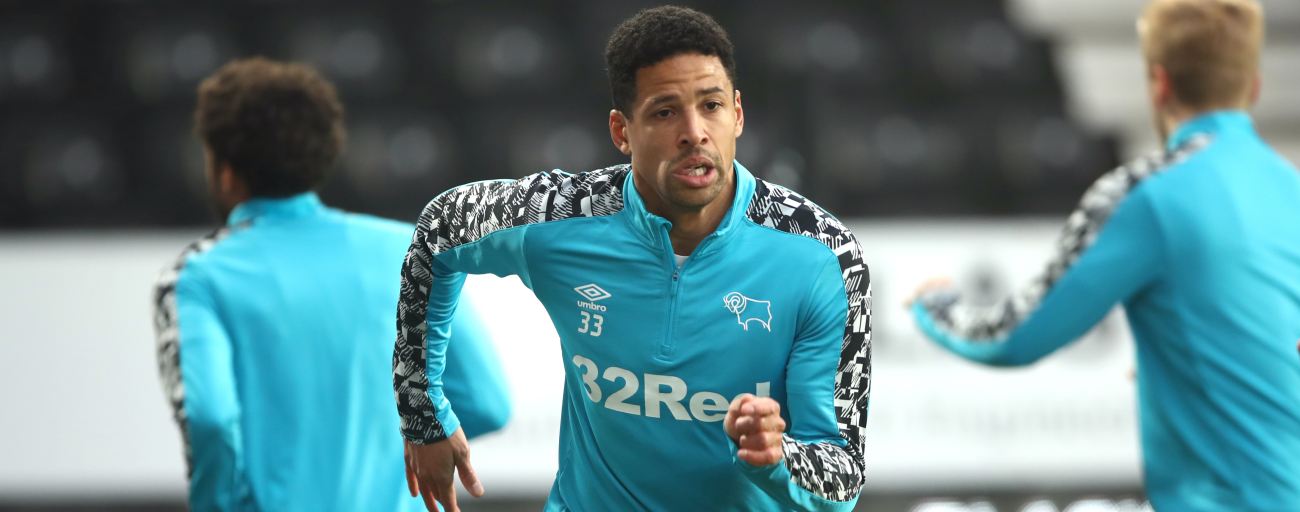
“I grew up in a multicultural society where Blacks, Asians and Whites were all the same,” he recalled. “As I got older and started to go round to my friends’, that’s when I started to realise that there is a difference. In one situation, I was with my two friends coming from basketball, one was Black and one was mixed-race and a load of my friends who were predominantly White were at the bottom of the road. The police had driven up the road past all of those, about ten of them, but they stopped us three.
“I must have been about 14 or 15. I had nothing to hide. They wanted to do a ‘stop and search’ so at the time I held my hands up and was like ‘yep, whatever’. But thinking back now, it’s like they drove past ten people sitting outside of a shop doing nothing, but they were happy to come up to us with a basketball in our hands, walking from a court and they wanted to ask us what we are doing and where we are going. Things need to change.”
When Rosenior was asked if he had a similar moment, a sad smile of recognition came to his face and with a small nod, the recollection of a major moment in his life came instantly. The moment was followed by a difficult talk by his White mum, who had previously been spat at for pushing her Black baby in a pram down the street.
“I was five years old and I was on the swing and my brother was three,” Rosenior said. “A kid said to another ‘why are those monkeys on a swing?’ When you are young you don’t understand what is going on, but when I asked my mum why they said that she was really upset. She had to explain to me, as a five-year-old, that because of the colour of my skin I might be perceived to be different. You understand in time that you are perceived to be different when you walk in to a room, or by how you dress, or what you say because people pre-judge you by the colour of your skin.”
ON THE RISE
Last season, Kick It Out, football’s equality and inclusion organisation, saw a 53 per cent rise in reports of racial abuse it the professional game from the previous season. Which is alarming in itself, never mind the fact the season was concluded behind closed doors or curtailed due to COVID-19.
Holmes, sadly, knows all too well about abuse in football whether that is when he is on the pitch or over social media. During the 2018/19 season, Holmes was the target of abuse at an away game at Brentford.
“The worst part about the Brentford abuse was that there was only me who saw it,” the midfielder said. “There were no cameras and people stood up for the individual, saying he didn’t do it. A few months later went back there and I was booed for 45 minutes because I reported racist abuse. That is ridiculous. Afterwards I was livid and wondering why people can’t keep the banter civil. I am very bubbly and I like to think I am funny. But when I see stuff like that it really gets to me and brings me down. I am quiet for a few days and it really annoys me.”
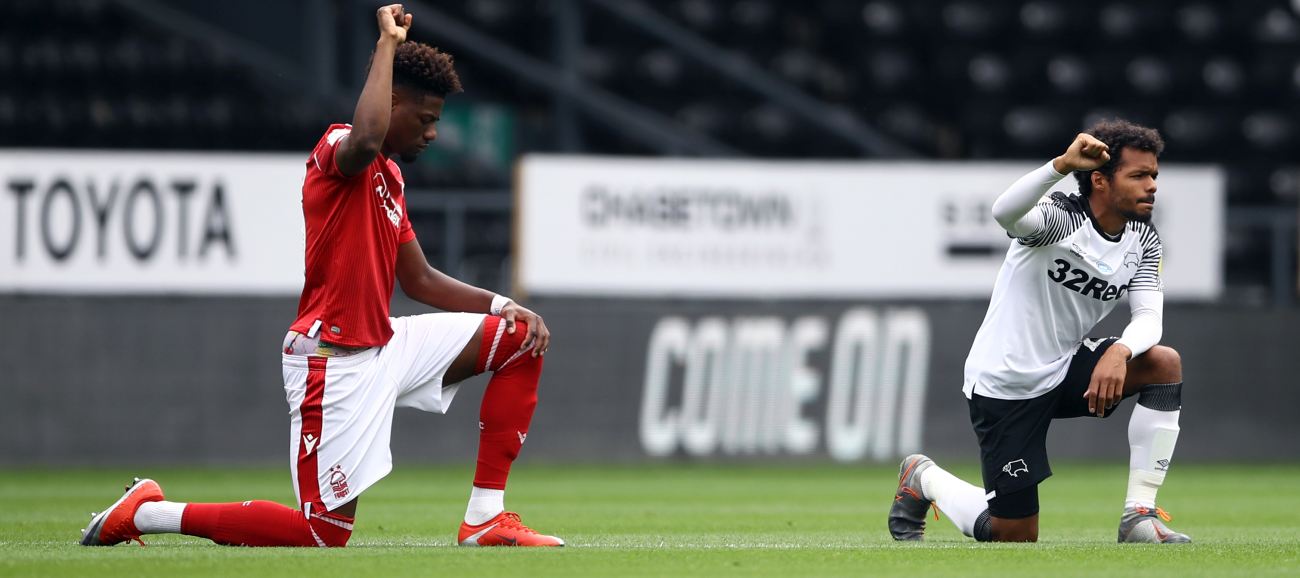
It is not a unique experience either. Davies recalled a time he was playing in Bulgaria and fans directed abuse to the Black players on the team and another time from a player in the FA Youth Cup. While Rosenior, who serves on the FA’s Inclusionary Advisory Board to help make the game more diverse in all areas, said it would take the next ten hours to recall the negative experiences he has had. Now, with social media, that problem has only been amplified and the perpetrators are able to hide their identity.
“I do believe that now with social media, people can hide behind keyboards,” Davies said. “People are now venting it and thinking they can get away with it. You can be two clicks away from sending someone something vile whether that’s racist, homophobic or anything to do with family – you can say anything you want and you can hide behind a little egg and you haven’t got a proper screen name so you can abuse them and delete the account. I think that is the big problem.”
Derby County strives to do whatever is necessary to eradicate racism and other abuse from the football club and the help of fans is vital. Any kind of abuse can be reported via a simple text indicating stands, seats and rows. Details are regularly shown on the LED boards around the pitch. Kick It Out, an organisation that has a designated fixture each season, also has an App that abuse can be reported to.
3-0 DOWN BUT NEVER GIVING UP
The importance of this fight goes beyond the obvious abuse, the slurs and the gestures. It is the times Rosenior was told he couldn’t become a coach because ‘there are no Black coaches’; it’s the moments people clutch themselves a little tighter when Davies wears his hood up walking on a cold winter night; it’s the times Holmes is followed around in shops by security guards. It is the fight to make sure at birth, everyone starts at 0-0, no matter their skin colour.
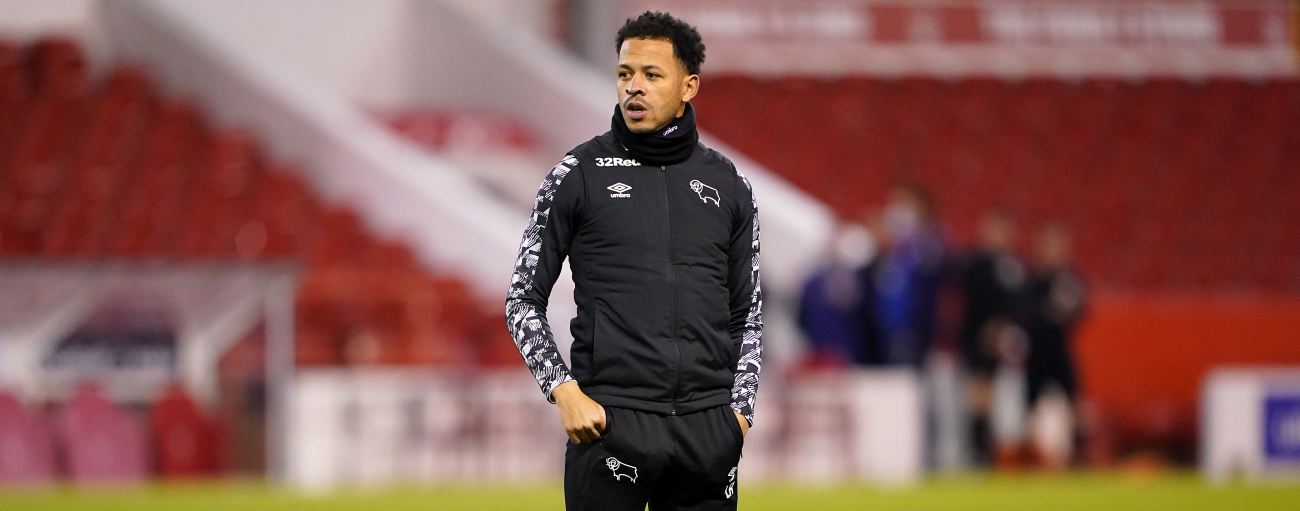
Rosenior, who like Davies, has Sierra Leonean heritage – a country that is still greatly suffering from the effects of the slave trade – has only ever dreamed of being a coach and manager after his playing days. There are only six Black head-coaches in the 92 professional football clubs, a striking disparity to the ratio of Black players.
It is Rosenior’s hope that he can continue to break down barriers that his hero and dad Leroy – one of the first Black managers in English football – first smashed through.
“In my skin, I have always known that I have to present myself maybe even more extremely to get across who I am,” he said. “I have to start from not zero, but minus. I think that is where there has been a misunderstanding in where what the Black Lives Matter movement means. It is just people saying that we would like to start from zero too.”
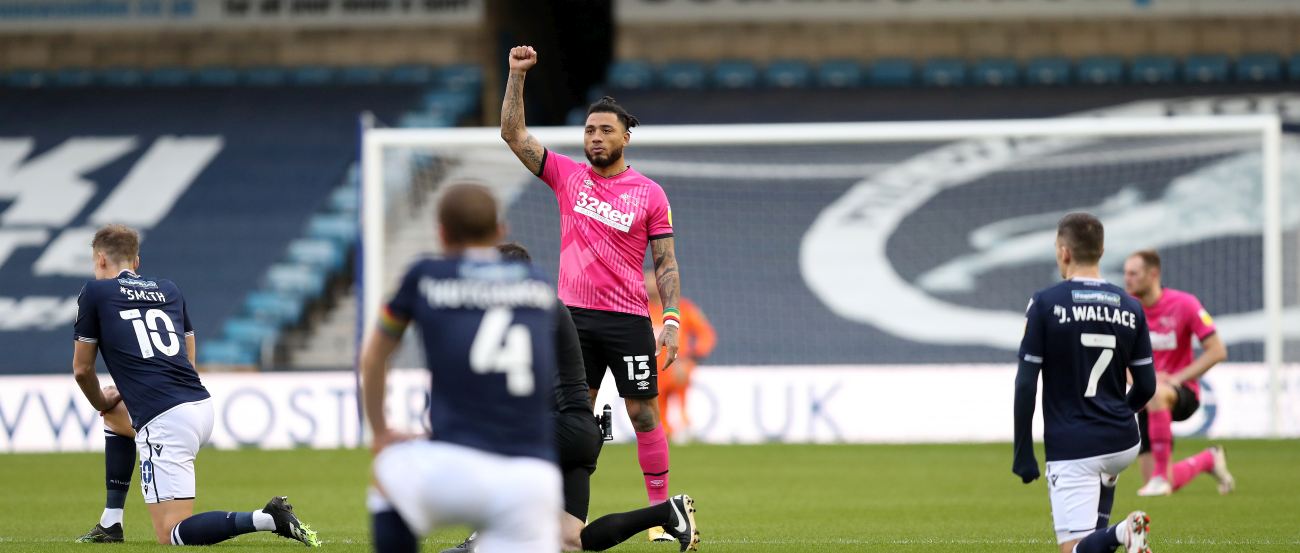
Rosenior added: “I remember people would not believe that my dad was a manager of a football team and the only reason they wouldn’t believe it was because he was quite young and he was Black. I think his generation and him breaking down those barriers has enabled me to be accepted as a coach now. My job is to represent myself and the club in the best way possible and be successful so we can open the doors for the next generation.
“I am one of very few Black or ethnic minorities coaching and I would love to see that change. Not just to tick boxes, but because you get different people, different backgrounds and different experiences and perspectives that may understand young Black players better. Do I understand players from my culture better than someone else, of course I do. If you have diversity in terms of the work force and people in authority, you can affect people you are working with in a much more positive way.”
Davies, who has recently completed a degree in football journalism, is slowly edging towards the time he looks at life after football. Whether he embarks on a career in media, coaching or the furthest thing from football, his only wish is that the playing field is level.
“Ultimately all I have ever wanted for myself is to be judged at my own merits,” the 35-year-old said. “The issues come up about Black coaches, Black managers, things like that. As a player at the wrong end of my career and, you have to think about those things. I believe in the best man for the job. When it comes to the time when I go for a job then I want to be judged on my merits and nothing to with the colour of my skin.”
IN SOLIDARITY
Four years ago, American Football player Colin Kaepernick took a bold and shocking stand against racial injustice and police brutality when he knelt in protest as the National Anthem played out before the game. By the end of the season he became a free agent. One of the best quarterbacks in the league has never played since.
The kneel by players ahead of games from NFL and NBA teams and leagues across England has become a powerful message and reminder that the fight for equality is far from over. It is a reminder that the Rams will continue to strive for equality every day.
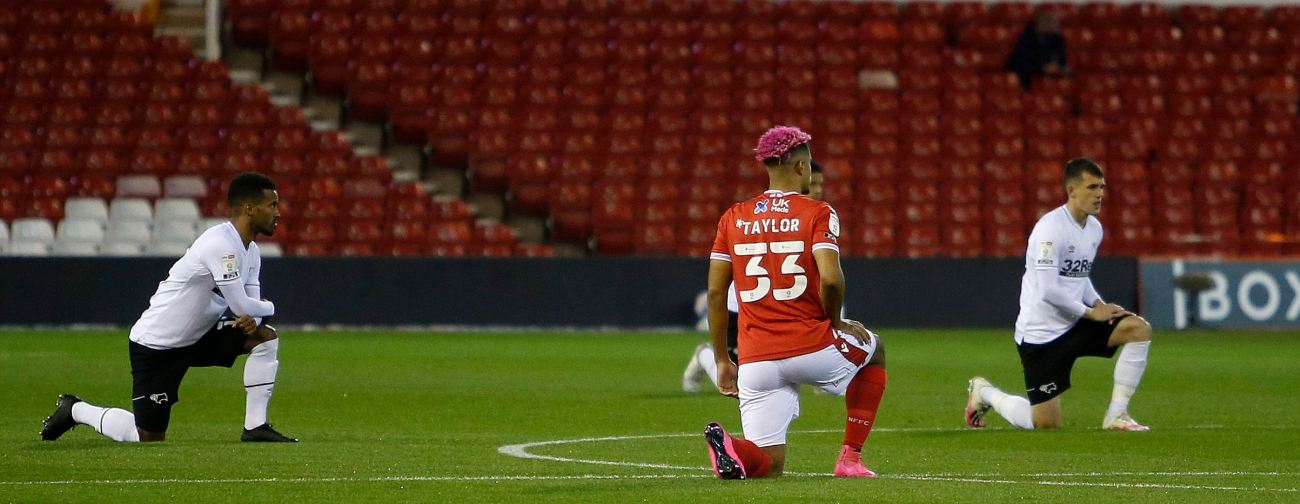
“It is a continued message and to keep it drummed in the head that this is not over,” Davies said. “It is not a fad. It is something that needs changing and by continuing to take the knee it is a reminder every single game, people can’t get away from it. You have to get yourself into the mindset of learning more about it. If you get a few people to research what it is about and the background of it then you have kind of won a little bit because they have educated themselves. They can then make their own decisions and that is based on their character.”
For Holmes, who was born in Georgia, USA - a former Confederate state that fought for the right to own slaves - that moment of kneeling makes him awash with emotion.
“To me it might mean more, because I am American and taking the knee started in America. That is a big thing for me, looking around and looking at my team-mates, White and Black and seeing them supporting our cause,” the 25-year-old said. “Then looking over at the opposition and seeing them doing the same thing. Black men with clutched fists is a sign of strength for me and it is a sign of we keep going until we get what we deserve and that is what we will do.”
The Black players have the full support of their team-mates too. For things to change, Black voices and gestures need to be amplified by peers of other races who, by the colour of their skin, instantly have a head start on life over Black people. For George Evans, he is prepared to go above and beyond to take a stand.
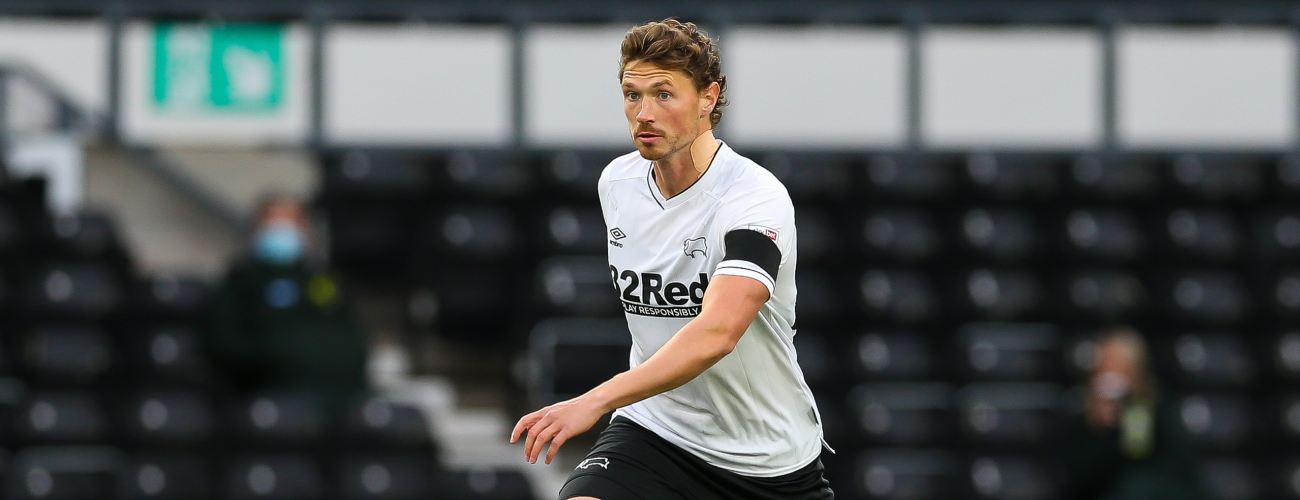
“It is vital for us to kneel with our Black team-mates,” the defensive midfielder said. “Everyone has to be equal regardless of their skin colour. It has gone on far too long and has been over-looked. It is something people should never have to deal with just being born with a different colour of skin. I think now, especially with taking a knee, we are taking a stand for it.”
He added: “I will never understand what Black people have had to put up with but it is something that I will never take lightly or think: ‘well it doesn’t affect me so I won’t bother about it’. We can’t do that as White people, if we see any form of racism, we have to go to the absolute maximum limits and make sure justice is done and it doesn’t happen again. We need to continue to speak on the subject and make sure it isn’t forgotten and that is something I am willing to do.”
BEYOND THE KNEE
The kneel and the slogans on shirts are only just the beginning. There must be relentless work behind the message. The Derby County Community Trust does tremendous work make our local community a better place for all and a designated inclusion team tackles themes that cause exclusion. A key strand of that is anti-discrimination. Throughout the year, the Trust visits schools, community spaces and parks to deliver anti-racism workshops in a fun and educational way.
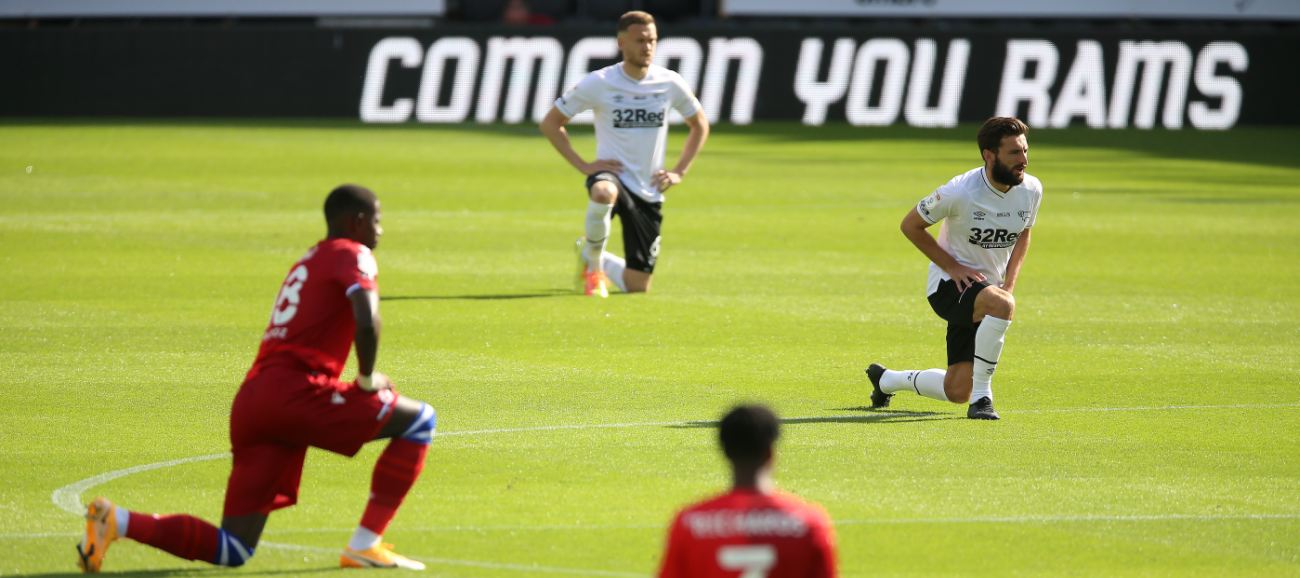
The Trust also works closely with Show Racism The Red Card, an anti-racism education charity. A new 12-week programme in conjunction with the charity has also been introduced to target 16-25-year-olds where playing football is combined with learning real stats and how to spot and stop racism in their communities, with the goal of becoming community ambassadors.
An annual Show Racism The Red Card event is also held at Pride Park Stadium where local schools are invited for a day full of activities and workshops to educate them on preventing racism. Last year, Rosenior was at the event alongside Max Lowe.
“School kids walk in from every different backgrounds and they are just like ‘wow, this is amazing’,” the former full-back said. “They never get to come to Pride Park on matchdays, they can’t afford to pay for the tickets, but they are there and they feel like a part of the club. The more work we do, the more children will feel a part of the club and therefore a part of the community and be proud to represent this area.
“I think it is really important work that we do, we have been really proactive as a football club in trying to create that atmosphere. It is a real community club and the best way we can keep doing it – firstly by winning games on the football pitch and being successful because people always want to be a part of that, but off the pitch, keep doing the work that our Community Trust do every single day. They do a great job. They work so hard for the right reasons, to make our community a better place and that is the most important thing.”
YOU DON’T KNOW WHAT YOU DON’T KNOW
For Rosenior, there is one saying that he lives by: “you don’t know what you don’t know”.
“For example if you take race as the issue – if I am a White person living in a predominantly White area I don’t come into contact with many Black people or people from different Ethnic backgrounds, then how do I know there is a problem,” the 36-year-old said. “I don’t think people who say things like ‘all lives matter’ are necessarily racist, they just don’t see that there is a problem because they haven’t experienced those things.
“In a perfect world, the best thing to move things forward would be for people to say ‘this group of people say there is a real problem’ instead of saying you don’t agree, you say ‘I don’t understand why, I need to find out why they think there is a problem and understand that’. If you do that then you can bring it from a place of unconscious to conscious. Still there is a large percentage of people all over the world where it is still in the unconscious section. That isn’t their fault, you don’t know what you don’t know.”
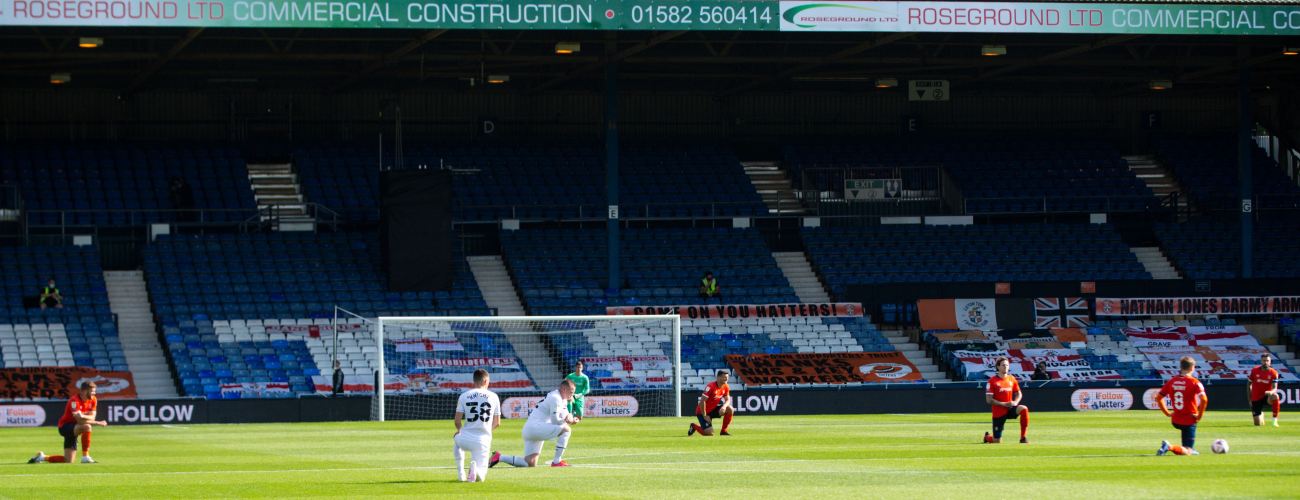
To make changes, education is vital. That can start with a simple conversation. It takes honesty from both parties, acceptance and a whole load of uncomfortableness, but the outcome, bit by bit, could be monumental.
Holmes said: “You have to want to learn and be open to admitting that maybe you have been wrong. Even the little things like you are walking through the city centre and you see a group of Black people, are you going to move out the way? Are you going to clutch your purse tighter? Are you going to assume that these people are a threat? These conversations are uncomfortable for both parties – real uncomfortable, but they are needed.”
They are conversations that are happening in the Rams’ dressing room. A space where banter no doubt bounces off the walls and bonds are strengthened as experiences and burdens are explained.
“We are fantastic friends inside that dressing room, players from all over the world and we don’t see each other as any different,” Evans said “I have got a lot of Black friends and I speak to them often about their experiences and things they have gone through. If there was anything they would want me to do to support them going forward I would back them 100 percent of the way to help end racism.”
BLACK AND WHITE TOGETHER
The blend of exciting youth and experienced senior players has been a major talking point surrounding Derby County in recent seasons, with the likes of Max Bird, Louie Sibley and Morgan Whittaker bursting on the scene to compliment the knowledge of players like Wayne Rooney, Davies, Graeme Shinnie. But among the squad, there is also a blend of races, cultures and nationalities. A blend that very much mirrors the city of Derby also.

“Our club is a very multicultural team, but society in Derby is very multicultural too,” Davies explained. “As a club it is important that we are sending the right message, not only the players, but through the media, commercial side, the Community Trust and doing anything we can do to keep the message going and keeping our club inclusive.
“Mel has always done that, he has always been brilliant with the community. We also have loads of different fan groups like the Punjabi Rams and things like that. We are very good at this football club and it shows that we are making a conscious effort to keep the message going and we are very aware of our society in Derby as well as the broader society around the country and the world.”
Rosenior added: “You make statements, but there has to be substance to it afterwards. I am proud to represent Derby, I think it is a wonderful football club with amazing traditions, amazing history. But even more so we represent a really diverse community.”
Football is all about the strength of the team and when one player is down, they are lifted up. Our Black peers have held this burden for too long and now it is up to me as a White media professional, you as a multi-cultural fanbase, the Club as a leader of this community and our players as role models to not stop fighting until Black lives matter, just as much as everyone else’s.
After all, we are, and always will be, Black and White together.
Interviews & Words: Livvi Sefton


 3/1 To Win
3/1 To Win
